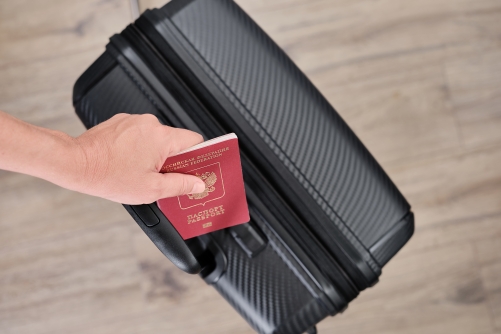An elderly European man was apprehended at Bahrain International Airport for attempting to enter the country using a forged passport. The 75-year-old man presented a European passport to an airport official, claiming it was his own. However, an investigation soon revealed the shocking truth. The airport official was carrying out his regular duties when the suspect approached him and handed over the European passport. The official processed the man’s entry into Bahrain, stamping the passport as per standard procedures. However, suspicions were later raised about the validity of the document.
Further inquiry revealed that the passport did not belong to the suspect. The authorities contacted the embassy of the European country in question and found that the passport had been reported as lost by its rightful owner and was flagged in international databases as being associated with several fraud cases. Forensic experts confirmed that the passport had been forged, with the original data pages and personal photograph replaced with fabricated ones. The suspect had meticulously altered the passport to conceal its true origins.
As a result of the investigation, the man was arrested and referred to the public prosecutor’s office. He now faces charges of colluding and assisting a well-intentioned official to enter false data into the government’s citizenship, passports, and residency systems, effectively using a forged European passport to illegally enter the country. The defendant will stand trial before the High Criminal Court, facing forgery charges.
This incident highlights the importance of thorough verification procedures at entry points such as airports to prevent individuals from using forged documents to enter a country illegally. Authorities must be vigilant and act quickly upon any suspicions to ensure the safety and security of the country and its citizens. The collaboration between airport officials, embassies, forensic experts, and law enforcement agencies in this case demonstrates the effectiveness of a coordinated approach in identifying and apprehending individuals involved in fraudulent activities.
Forging a passport is a serious offense that can have severe legal consequences. In this case, the elderly man now faces charges of forgery, which can result in significant fines, imprisonment, or deportation. The use of forged documents not only undermines the integrity of the country’s border control system but also poses a security risk by allowing individuals with criminal intentions to enter undetected. It is essential for authorities to remain vigilant and continuously update their verification processes to combat such fraudulent activities.
The implications of this incident extend beyond the individual involved, as it raises concerns about the potential loopholes in border security that can be exploited by criminals. It is essential for countries to enhance their border control measures, including the use of advanced technology and training for officials, to detect and prevent the use of forged documents. Collaborative efforts between countries and international agencies are crucial in combatting transnational crimes such as identity fraud and human trafficking that often involve the use of forged documents.
Overall, the apprehension of the elderly European man at Bahrain International Airport for attempting to enter the country using a forged passport serves as a reminder of the importance of maintaining robust security measures at entry points. The swift action taken by authorities to investigate and apprehend the individual demonstrates the commitment to upholding the rule of law and protecting the country from fraudulent activities. It also underscores the need for continuous vigilance and cooperation between various agencies to combat crimes such as identity fraud and forgery effectively. By strengthening border control measures and enhancing collaboration, countries can prevent individuals from exploiting vulnerabilities in the system and uphold the integrity of their borders.










